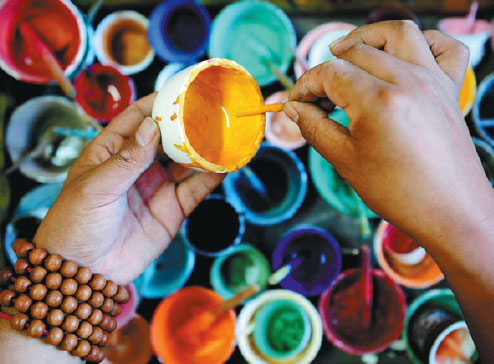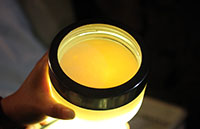Pigment producers push to protect ancient art
Updated: 2015-07-16 07:51
By Palden Nyima(China Daily)
|
|||||||||||
 |
|
Ores are broken into pieces before being ground to a fine powder in a water-filled stone groove. |
Traditionally, thangka painters made their own pigments, but they were for personal use and not for sale. The arrival of the market economy resulted in changes, though, and Lhasa Ancient Architectural Arts trademarked its pigments 15 years ago.
The company employs eight thangka masters, more than 30 apprentices and five pigment producers, who make 18 different pigments, all the colors a painter needs.
Moldmakers, coppersmiths, welders, carpenters and stonemasons are also employed, so whenever renovation work is scheduled for ancient buildings and monasteries, the company can provide a full range of services. That edge means business is usually good.
The company's pigments are sold across the Qinghai-Tibet Plateau, in other parts of China, and even overseas in places such as the United Kingdom and France.
"An old Tibetan proverb says: 'Some work requires a light, sick person's touch, while other jobs require great strength, like that of a strong, young man', " Penpa said.
"The process of producing pigments requires a great deal of patience, time and different strengths during different procedures, so the work is carried out exclusively by women," he added.
Contact the writer at palden_nyima@chinadaily.com.cn
Today's Top News
France returns 32 cultural relics to Chinese museum
Mayor to turn Zhanjiang into green economic powerhouse
Private firms' access to arms sector widens
Warren Buffett, Johnny Depp buy Greek islands
China, World Bank pledge $50m for poor
Web companies asked to support 'digital Silk Road': Zhanjiang forum
Risks growing for cybersecurity
China's stock wobbles may deter foreign investors - for now
Hot Topics
Lunar probe , China growth forecasts, Emission rules get tougher, China seen through 'colored lens', International board,
Editor's Picks

|

|

|

|

|

|






